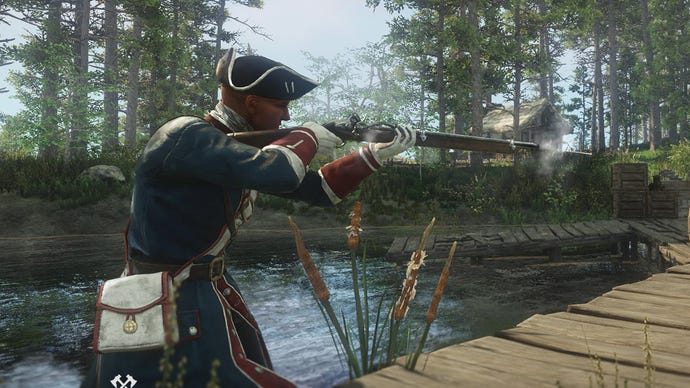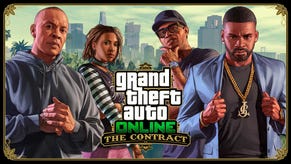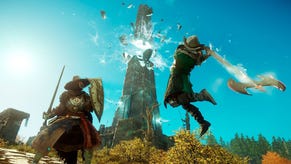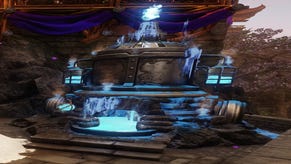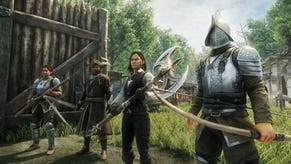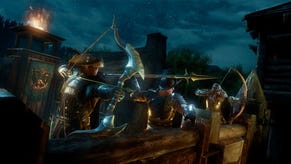New World is Amazon's Latest Attempt to Break Into Online Gaming. What the Developers Have to Say About Solo Play, Twitch, and More
Amazon Game Studios offers an extended peek at its latest attempt to break into the online gaming market.
This article first appeared on USgamer, a partner publication of VG247. Some content, such as this article, has been migrated to VG247 for posterity after USgamer's closure - but it has not been edited or further vetted by the VG247 team.
Even for Amazon, a company with basically unlimited resources, establishing a new online game is difficult. Its first effort, Breakaway, was quietly axed last year, and its other efforts have mostly remained out of sight. Amazon is hoping New World, its second of three major games, is more successful.
Developed by Amazon's Orange County studio, formerly Double Helix Games, New World is being pitched as a kind of medieval EVE Online-a sandbox MMO in which players join together to build communities, control territory, and battle one another. Backing this ambitious effort is Amazon's massive cloud-based infrastructure as well as Twitch, which is now in its fifth year under the Amazon umbrella. For Amazon Game Studios, the mandate is clear: launch a game that can take advantage of Amazon's considerable built-in advantages.
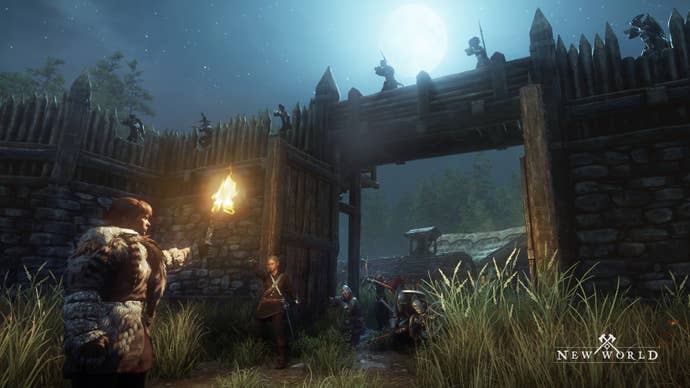
Amazon showed New World to the press earlier this week, and while it was only a tiny taste of what the final game will be like, the possibilities are enticing. In the space of an hour, I crafted weapons, gathered with allies in a player-built castle, and used exploding barrels to knock down another alliance's fortress. The systems underlying all of this are dense and complex, featuring multiple characters classes and lots of gear to craft.
Still, I had questions. Once I was finished, I sat down with the team from Amazon Game Studios to talk about solo play, the story, and more. Here's what they had to say.
From what I have been able to play, PVP seems to be a huge portion of the game. The main driving thrust of the game. Is that kind of fair to say?
Patrick Gilmore, Amazon Game Studios Orange County Studio Head: PvP is the core of the game, and I say "the core" rather than the "driving thrust" because we do build out a lot of mechanics and features that extend beyond the PvP experience. So it's kind of the foundation of the game. What we like is the constant state of drama and tension that you can have in a PvP environment. But we have a lot of features that help players cope with that, manage that, and sort of soften some of the hard edges that are common in PVP games.
Online worlds are famously chaotic. Players are constantly defining their own sandbox and doing crazy things, with lots of fascinating stories coming out of it. Are you hoping for something like that in New World?
Patrick Gilmore: We've passionate about the sandbox idea, so I would say that the answer to that is "yes." Our foundational thinking is we want players to bring their own structure. We want as much freedom as possible. Our goal is not to send a player down a rail and have them go through some scripted content. Our goal is for players to bring that structure, interact with each other, and define what they want that world to be. Natural tension, conflicting quests and objectives all emerge from that as a result of players having that level of freedom in the sandbox.
Tell me a little bit about the guild infrastructure that you've implemented in New World.
John Liberto, Lead Game Systems Designer: Players in New World can join guilds, which we call "companies." A company is capable of controlling a territory, and within that territory, they control all the resources. From a structural standpoint, only companies are in the game right now, and we see soft alliances forming between groups of players in nearby companies. We see these social threads emerging among players in the alpha right now. Really, "emerging" is the right word here; this emergent player behavior that the social construction enables.
Patrick Gilmore: Simply, every player who comes into the game has a company. You craft your own guild; you craft your own crest; other players can join you, you can join other players and those social organizations. There are tools in the game for players to organize around that stuff. A lot of the gameplay that John is talking about emerges as a result of those large-scale player organizations.
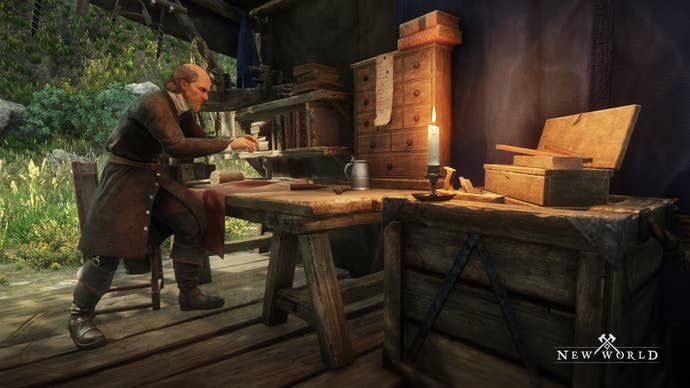
Let's say I mostly prefer to play solo. What does the experience in New World look like to me?
Patrick Gilmore: There is a ton of solo play in this game. Tons of exploration. Tons of points of interest. We're increasing the investment in solo play over time as well. In the next several months, you are going to see more and more solo features coming online.
Scot Lane, Director: I think part of the sandbox allows you to define the experience. I actually played for the last month solo because we have been getting this a lot. I think the sandbox empowers that because it allows me to decide what I'm doing. Lately, my goal has been to explore all the outposts. Traveling. Collecting goods and then trying to make money on the trading posts. There are a lot of different ways you can play the game and we are constantly leaning more into solo play.
How much in the way of cooperative PvE content can we expect? High level raids and that kind of thing?
Scot Lane: Right now we don't really have high level raids. Our game is completely focused on high level raid PvP; the massive battles where I think New World sings. Going forward, we are looking at bringing in boss creatures and eventually raid creatures, but we don't have a timeline on that.
How deep is the story?
Patrick Gilmore: It's very in-depth. In a future update, you are gonna see our sandbox version of lore that is discoverable throughout the world. We love the idea of it being this kind of rashomon experience where all lore will come to you through the filter of the person witnessing the event. They may be a dubious witness, they may be an authentic witness, you don't know, but you are going to have lots of different versions of what happened in this place before you got there.
So there is going to be a lot of environmental storytelling?
Patrick Gilmore: There will be, yeah. It can come in the form of the commission papers from somebody else who came here. Or in the story of a family who is trying to survive, or in diaries, journals, and letters. It can even come through signage and engravings that are on some of the monuments. It can come in a variety of different ways.
Twitch is obviously owned by Amazon. How do you foresee this plugging into Twitch?
Patrick Gilmore: We've talked to a tremendous number of content creators for this game, and we have a ton of ideas. What we're primarily focused on is what kind of tools we can provide content creators for coordinating games; identifying themselves in-game, and making their role as a broadcaster kind of a focal point for entertainment and context in the world. We will have more to say about that stuff in the future, but we are pretty excited about where we are going in Twitch.
You guys have touched on microtransactions. Can you elaborate?
Patrick Gilmore: We don't have the business model completely nailed down. We know that it isn't going to be loot boxes, and we know the business model that we choose is really gonna emphasize as much accessibility for as many players as possible. So, plain and simple, it's ultimately what we want to achieve, but we don't have all the detail locked down. We will talk about that at a later date.
I would say making a successful online platform is probably the hardest thing you can possibly do these days, and there have been a number of high-profile failures. What lessons have you taken from those failures in making sure that New World can be successful?
Patrick Gilmore: There have been a lot of cautionary tales, and we have learned a lot about best practices. I think the biggest piece of feedback I can give is that we have been in alpha for five months now. We've been earning from players, refining the game, and making sure that everything is great. We are very, very committed to not releasing New World until we are really convinced that it's ready. We are constantly learning, and we're constantly improving and fixing problems. That sort of high level of online service is something that is really important to us.
